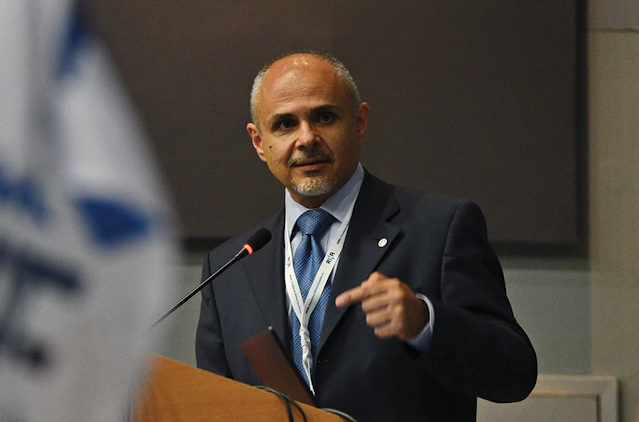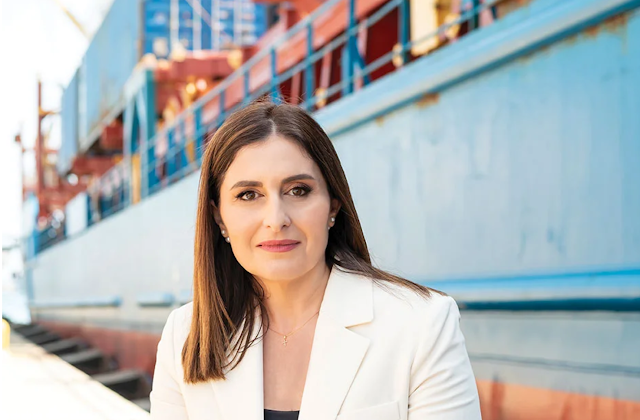Spyridon Zolotas: RINA’s Vision for the Future | A Commitment to Innovation and Sustainability
| Spyridon Zolotas, Marine Southern Europe, Middle East & Africa Area Senior Director, RINA |
The shipping industry is facing huge challenges to decarbonize and meet the targets set by IMO 2030 and 2050, but it is already making visible and effective efforts to be on the right path. With still much uncertainty around which technology will be the forerunner to meet emission reduction targets for the future, shipowners have to plan their investments now; they will surely have to make choices outside the norm but, to this day, much of the new build order book remains with traditional fuels or LNG. However, we need to start reducing emissions immediately. The challenge faced needs to be addressed on all fronts: new fuels, new technology, and new ways of operating. Classification Societies are evolving into professional transformation advisors and regulatory experts for an uncertain commercial world.
There is no crystal ball to tell us what the prevailing solution will be for the decarbonization of shipping. No option can be excluded, and all technologies and alternative fuels must be explored. On the other hand, the world fleet ages, new building activity continues, and owners’ investment must be secured. Opting for new ships with the flexibility to adapt in a rapidly changing world, is the key value that needs to be implemented in the ship design of today.
When considering new fuels, shipowners are faced with problems relating to available onshore infrastructure and knowing which fuels will be readily available for bunkering in the future. In the light of the above considerations, we signed a joint Development Project with Maran Dry Management Inc. and SDARI for an LNG and hydrogen powered 210,000 DWT bulk carrier. The project is based on a propulsion arrangement which reduces the running machinery at sea and combines the ship’s fuel (LNG) with steam to produce hydrogen. The project sees the design, which was launched last year for an MR tanker, in its first application for a bulk carrier.
Hydrogen appears to be one of the most promising fuels to reduce CO2 emissions and, by producing it onboard, shipowners could take away the risks associated with its use as a fuel in terms of availability and price and embrace the advantages today. Through LNG, a widely available fuel, and steam reforming, a fully developed technology, with pre-combustion carbon capture, hydrogen and CO2 can be produced onboard. Then they can be separated by means of the cryogenic temperature (-163oC) at which LNG is stored in its tank.
Since LNG offers an immediate and significant reduction of GHG emissions, an LNG fuelled vessel doesn’t need to have the reformer installed upon delivery from the yard. This operation can be done at any following drydock the shipowner considers suitable and could even be postponed even beyond 2035.
Engine technology can already burn today 25% volumes of hydrogen and increased percentage will follow rapidly. The progressive addition of H2 in the mixture, reduces the GHG emissions as it improves the H/C ratio of the fuel, the combustion and reduces substantially the methane slip, making it negligible.
Of course, to encourage the industry to invest in new fuels/technologies it is of paramount importance to have the reassurance that the safety standards for their use are being harmonized. In this respect, class societies and the work that bodies such as the IACS’ Safe-Decarbonisation Panel, chaired by RINA, are doing together with all stakeholders will surely introduce common criteria to support the safe design of systems for the use of new technologies.
Digital solutions are essential for effective management of reporting requirements and adhering to environmental legislation which has become increasingly complex.
Shipping must leverage the benefits of digitalization to strengthen the resilience of the maritime supply chain, promote sustainable development, and ensure compliance with all regulatory frameworks.
The effort to increase automation in shipping offers the opportunity to enhance onboard safety and to improve environmental performance, but also to grant reassurance to more efficient and sustainable shipping.
One of the challenges of modern shipping is the need for accurate ship performance status, informed decision-making, and efficient operations and reporting. To address this, it is crucial to have reliable datasets. Collecting data onboard is just the first step, organizing and validating the data is also essential to enable sophisticated analysis using powerful tools. With such data management in place, it becomes possible to simulate operations and achieve set targets while meeting regulatory requirements.
Additionally, interconnectivity and integration among all different applications that are currently used by shipping companies and of course the exchange of data is a vital element for a successful use of digitalization. This will be essential for the efficiency and sustainability of the digital tools in maritime industry.
The integration of digital tools will eliminate inserting the same data in multiple sources with the potential of an error to increase exponentially. The greater level of collaboration we achieve among digital tools, the higher the engagement of the crew to use them.
By leveraging such tools, businesses can gain valuable insights into their operations through real-time data feeds and alerts. This optimization process can lead to enhanced efficiency and effectiveness in shipping operations.
In our attempt to assist the shipping community to overcome daily challenges, RINA has developed a series of tools and services.
Our web-based applications are installed both onboard all vessels and onshore ensuring availability of data everywhere. The web applications are constantly synchronized, exchanging data in both directions. By monitoring fleet operations through a cloud-based live streaming from ship(s) to shore, shipping companies can also take data driven decisions to improve business operations.
Our offering spans from a complete Fleet Management System to Performance Monitoring, Vessel Reporting System and Electronic Logbooks. The SERTICA Fleet Management System not only ensures safe, environmentally friendly operation and minimizes costs, but also optimizes maintenance efforts, increases awareness about equipment availability, and monitors the rate of equipment deterioration.
The Vessel Reporting System is a comprehensive solution covering all noon reporting needs as well as standard reports for EU MRV, IMO DCS, CII, and Performance. The owner has the flexibility to create his own reports. CII index can be calculated by setting up reports in the Vessel Reporting System to get an accurate and comprehensive picture of a ship’s carbon emissions and energy efficiency. Vessel reporting simplifies daily workflows, increases quality of data, and connects all stakeholders to one report. The Vessel Reporting System (VRS) not only helps ships and operators comply with current reporting regulations but also prepares and adapts them for future challenges from a more and more interconnected world.
SERTICA Electronic Logbooks are designed to adhere to the relevant MARPOL regulations, assisting shipping companies in collecting data to ensure compliance with regulatory requirements.
The implementation of digital solutions can provide a strategic advantage through data-driven solutions. By analyzing data collected over extended periods, businesses can make informed decisions that improve performance and efficiency daily.
In conclusion, innovation is at the heart of RINA. We are continually reviewing, adapting and issuing new services and support that align with the changing challenges the industry is facing. In particular, we have a strong programme of recruitment and are continuously looking to invest in new people with new ideas. We have adopted full smart working practices and have developed our facilities to promote innovation. The ability to adapt and provide innovative services that our customers need is clear from the growth we have been experiencing within the marine sector. We have seen exceptional growth year after year, increasing our fleet substantially more than other class societies. Last year we experienced 17% fleet growth and now have nearly 9,000 vessels and 70 million GT. RINA has recently issued several new services, including DOLPHIN QUIET, for the protection of marine flora and fauna, SUSTAINABLE SHIPS, and BIOSAFE additional notations.




